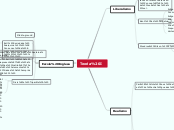por Gabrielle Hoshi 8 anos atrás
497
Teoria I

por Gabrielle Hoshi 8 anos atrás
497

Mais informações
Meio de cooperação entre os Estados para cultivar a paz. (Influência Kantiana).
3º Grande Debate: Metodológico.
2º Grande Debate: Epistemológico.
1º Grande Debate: Ontológico. Disputa quanto ao papel dos valores.